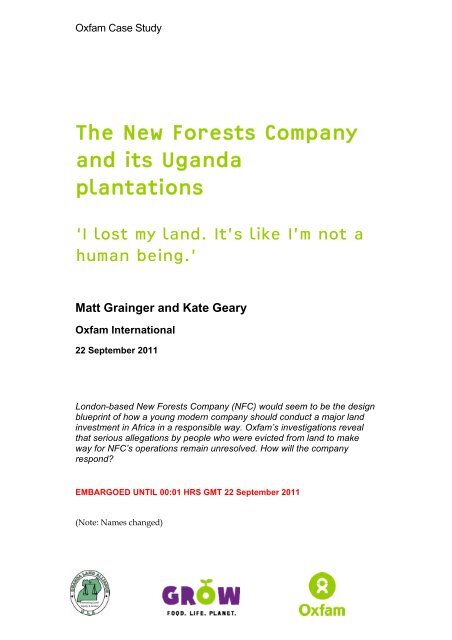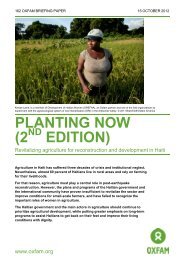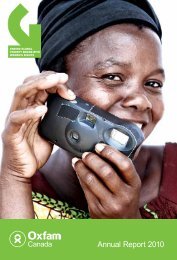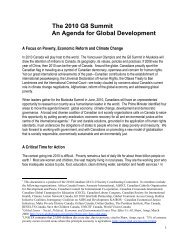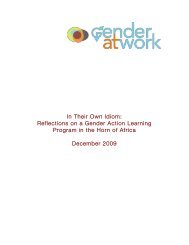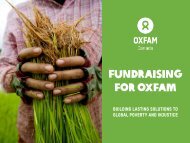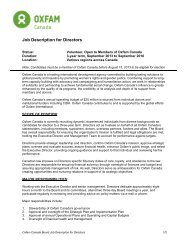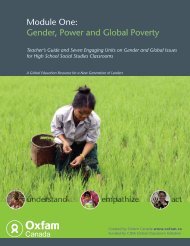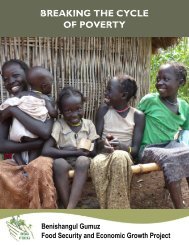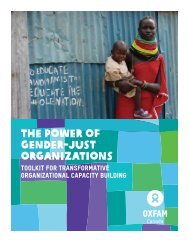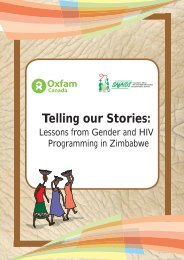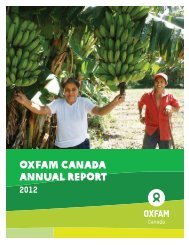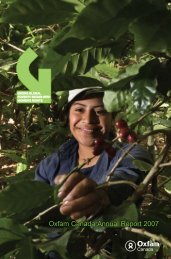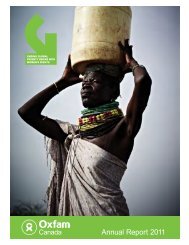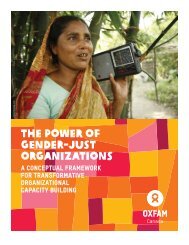The New Forests Company and its Uganda ... - Oxfam Canada
The New Forests Company and its Uganda ... - Oxfam Canada
The New Forests Company and its Uganda ... - Oxfam Canada
You also want an ePaper? Increase the reach of your titles
YUMPU automatically turns print PDFs into web optimized ePapers that Google loves.
<strong>Oxfam</strong> Case Study<br />
<strong>The</strong> <strong>New</strong> <strong>Forests</strong> <strong>Company</strong><br />
<strong>and</strong> <strong>its</strong> Ug<strong>and</strong>a<br />
plantations<br />
‘I lost my l<strong>and</strong>. It’s like I’m not a<br />
human being.’<br />
Matt Grainger <strong>and</strong> Kate Geary<br />
<strong>Oxfam</strong> International<br />
22 September 2011<br />
London-based <strong>New</strong> <strong>Forests</strong> <strong>Company</strong> (NFC) would seem to be the design<br />
blueprint of how a young modern company should conduct a major l<strong>and</strong><br />
investment in Africa in a responsible way. <strong>Oxfam</strong>’s investigations reveal<br />
that serious allegations by people who were evicted from l<strong>and</strong> to make<br />
way for NFC’s operations remain unresolved. How will the company<br />
respond<br />
EMBARGOED UNTIL 00:01 HRS GMT 22 September 2011<br />
(Note: Names changed)
W<br />
hen the <strong>New</strong> <strong>Forests</strong> <strong>Company</strong> (NFC) was formed in 2004 <strong>its</strong> management’s aim<br />
was for it to become East Africa’s biggest forester. <strong>The</strong> UK-registered company has<br />
achieved that, along the way building <strong>its</strong>elf a high-powered <strong>and</strong> influential corporate CV. 1<br />
Today, the NFC plants <strong>and</strong> harvests timber on 27,000 hectares of ‘underutilized <strong>and</strong>/or<br />
degraded’ l<strong>and</strong> in Ug<strong>and</strong>a, Tanzania, Mozambique, <strong>and</strong> Rw<strong>and</strong>a; it has deals in those<br />
countries totalling around 90,000 hectares. 2 <strong>The</strong> plantations contribute jobs <strong>and</strong> revenue,<br />
along with the timber products those countries need as they develop <strong>and</strong> which would<br />
otherwise be logged from natural forests. NFC hopes to attract more revenue from<br />
carbon cred<strong>its</strong>, obliging the company to submit a full Project Design Document to the<br />
UN’s Clean Development Mechanism. 3 In 2008, the Ug<strong>and</strong>a Investment Authority named<br />
NFC an ‘Investor of the Year’. 4 <strong>The</strong> Forest Stewardship Council (FSC) – the global gold<br />
st<strong>and</strong>ard for forestry best practice – has certified two of NFC’s Ug<strong>and</strong>an plantations. 5 <strong>The</strong><br />
company has strong political ties in the countries where it works, from central government<br />
down to local level. NFC has attracted investment from international banks <strong>and</strong> private<br />
equity funds since 2008. <strong>The</strong> European Investment Bank (EIB), the EU’s financing<br />
institution, has loaned NFC five million Euros to exp<strong>and</strong> one of <strong>its</strong> Ug<strong>and</strong>an plantations.<br />
Agri-Vie Agribusiness Fund, a private equity investment fund focused on food <strong>and</strong><br />
agribusiness in sub-Saharan Africa, has invested $6.7m in NFC. Agri-Vie is <strong>its</strong>elf backed<br />
by development finance institutions, notably the World Bank’s private sector lending arm,<br />
the International Finance Corporation (IFC). <strong>The</strong> most significant investment in NFC<br />
comes from HSBC (around $10m), which gives HSBC 20 per cent ownership of the<br />
company <strong>and</strong> one of six seats on the NFC Board. <strong>The</strong>se investors have social <strong>and</strong><br />
environmental st<strong>and</strong>ards to maintain in administering their own portfolios.<br />
NFC runs education, health, <strong>and</strong> income-generation programmes with local communities;<br />
in Ug<strong>and</strong>a, for example, it has built school rooms, health clinics, wells, <strong>and</strong> latrines, <strong>and</strong><br />
runs literacy programmes <strong>and</strong> tree out-sourcing schemes which are ‘dem<strong>and</strong>-driven’ <strong>and</strong><br />
‘locally-owned’. 6 <strong>The</strong> company says it is now developing a system to quantify the positive<br />
social impacts that it ‘anecdotally <strong>and</strong> theoretically’ knows are already happening as a<br />
result of <strong>its</strong> investments. 7<br />
L<strong>and</strong> has always been a contentious <strong>and</strong> emotive issue, even more so today given fierce<br />
competition over <strong>its</strong> use <strong>and</strong> spiralling value – <strong>and</strong> particularly so in Africa. NFC appears,<br />
on the face of it, to be the design blueprint for how a young modern business can conduct<br />
a major l<strong>and</strong> investment in Africa in a responsible <strong>and</strong> ethical way. It has economic<br />
power, professional expertise, <strong>and</strong> close political support. It has a h<strong>and</strong>s-on chief<br />
executive with local knowledge <strong>and</strong> ethical credentials. 8 <strong>The</strong> company <strong>and</strong> <strong>its</strong> investors<br />
have clear environmental <strong>and</strong> social st<strong>and</strong>ards they commit to uphold <strong>and</strong> has corporate<br />
social responsibility <strong>and</strong> accountability principles embedded at the heart of <strong>its</strong> operations. 9<br />
Given all this, how is it possible that thous<strong>and</strong>s of people in affected communities have<br />
alleged that l<strong>and</strong> clearances, which have taken place to make way for NFC’s operations<br />
in Ug<strong>and</strong>a, have been accompanied by distress <strong>and</strong> violence, <strong>and</strong> have left many in a<br />
state of poverty<br />
‘I<br />
remember my l<strong>and</strong>, three acres of coffee, many trees – mangoes <strong>and</strong> avocados. I had<br />
five acres of banana,’ Francis Longoli says. ‘I was given awards as a model farmer. I<br />
had cows for milk, ten beehives, two beautiful permanent houses. My l<strong>and</strong> gave me<br />
everything from my living to my children’s education. People used to call me Omataka –<br />
someone who owns l<strong>and</strong>. Now that is no more. I am one of the poorest now.’ 10<br />
Francis is among more than twenty thous<strong>and</strong> people 11 who have been evicted from their<br />
homes <strong>and</strong> l<strong>and</strong> in Kiboga district, <strong>and</strong> in nearby Mubende district, to make way for NFC<br />
plantations.<br />
<strong>The</strong> Ug<strong>and</strong>an National Forestry Authority (NFA) granted licences over the plantation<br />
areas to NFC in 2005 <strong>and</strong> embarked on procedures to remove the former residents,<br />
which it claimed were ‘illegal encroachers’. 12 This had taken place by February 2010 in<br />
Mubende <strong>and</strong> between 2006 <strong>and</strong> July 2010 in Kiboga. 13 <strong>Oxfam</strong>’s research estimates that<br />
2<br />
<strong>The</strong> <strong>New</strong> <strong>Forests</strong> <strong>Company</strong> <strong>and</strong> <strong>its</strong> Ug<strong>and</strong>a plantations<br />
<strong>Oxfam</strong> Case Study, September 2011
the number of evictees is in the region of 22,500, although that figure could be<br />
substantially higher. 14 NFC, on the other h<strong>and</strong>, claim that this figure is no more than<br />
15,191. Even this figure, they say, is likely to be significantly inflated since it is partly<br />
based on a survey conducted by the District Planner from Kiboga, which they claim is<br />
unreliable, despite that survey having been paid for by NFC. 15<br />
It is alleged in the legal claims lodged by a large number of local villagers against NFC<br />
that individuals whom they believe to be NFC employees took part in evictions. 16 NFC<br />
strongly denies this allegation, stating that the l<strong>and</strong> clearances were voluntary <strong>and</strong> that<br />
the company played no role in them since ‘it is the sole m<strong>and</strong>ate of the National Forestry<br />
Authority to document, engage with, <strong>and</strong> peacefully vacate any individuals illegally<br />
settling on Central Forest Reserves’. 17 It states that it placed NFC employees on the<br />
plantations to observe the eviction process, but states that NFC played no part in the<br />
evictions themselves. 18<br />
Today, the people evicted from the l<strong>and</strong> are desperate, having been driven into poverty<br />
<strong>and</strong> l<strong>and</strong>lessness. In some instances they say they were subjected to violence <strong>and</strong> their<br />
property, crops, <strong>and</strong> livestock destroyed. <strong>The</strong>y say they were not properly consulted,<br />
have been offered no adequate compensation, <strong>and</strong> have received no alternative l<strong>and</strong>. 19<br />
Some of the affected people in Mubende district say that their l<strong>and</strong> had been given to<br />
them in recognition of their fathers or gr<strong>and</strong>fathers having fought in the British army in<br />
Burma <strong>and</strong> Egypt during the Second World War. Others say they were in the process of<br />
converting their title from customary to freehold tenure. Those evicted in Kiboga district<br />
state that they had been settled on their l<strong>and</strong> for 40 years or more having been invited<br />
there by the Idi Amin regime. <strong>The</strong>y had functioning village <strong>and</strong> government structures,<br />
such as local council systems, schools, health centres, churches, permanent homes, <strong>and</strong><br />
farms on which they grew crops to feed themselves <strong>and</strong> surpluses to sell at market. <strong>The</strong>y<br />
paid taxes. <strong>The</strong>irs were strong <strong>and</strong> thriving permanent communities. 20<br />
In 2004, NFC began negotiating with the Ug<strong>and</strong>an Government for a commercial timber<br />
deal. <strong>The</strong> state granted the company a licence to develop three timber plantations – in<br />
total around 20,000 hectares of l<strong>and</strong> – in Mubende, Kiboga, <strong>and</strong> Bugiri districts. <strong>The</strong><br />
company began work in 2005 with a plan to invest $47m over ten years. It has already<br />
planted around 12 million pine <strong>and</strong> eucalyptus trees on 9,300 hectares <strong>and</strong> says it<br />
employs more than 1,400 people.<br />
NFC does not own or lease the l<strong>and</strong> in Mubende or Kiboga districts. Its licence comes<br />
with strict conditions, the company says, including not to grow food crops or allow cattle<br />
grazing <strong>and</strong> to ‘strictly defend the boundaries of the reserves’. 21 <strong>The</strong> l<strong>and</strong> is gazetted,<br />
which means it is protected as a matter of national importance. In Mubende, the gazetted<br />
l<strong>and</strong> that the state licensed to NFC is the Namwasa Forest Reserve (8,958 hectares), <strong>and</strong><br />
in Kiboga, it is the Luwunga Forest Reserve (9,383 hectares). <strong>The</strong>re are also special laws<br />
governing forest reserves that make it illegal to grow crops, graze cattle, or erect<br />
buildings. 22<br />
NFC states in <strong>its</strong> 2010 Sustainability Report that ‘using the law is not always the<br />
appropriate course of action as it is always the poorest who suffer most <strong>and</strong> irrespective<br />
of the legal position we have a moral obligation, <strong>and</strong> a pragmatic need, to win hearts <strong>and</strong><br />
minds <strong>and</strong> mitigate negative consequences of our investment’. 23 In this case, however,<br />
NFC argues ‘no party has proven that the l<strong>and</strong> was de–gazetted <strong>and</strong> thus, the<br />
encroachers are illegally occupying l<strong>and</strong> leased to an independent third party, NFC’. 24 It<br />
relies upon an ‘extensive <strong>and</strong> exhaustive government-driven authentication process’,<br />
which it says confirmed that only 31 families on the Namwasa Reserve, <strong>and</strong> none in the<br />
Luwunga reserve, had legal rights to remain on the l<strong>and</strong>. 25 It states that it is respecting the<br />
rights of these families <strong>and</strong> that dealing with ‘illegal’ settlers is the sole m<strong>and</strong>ate of the<br />
NFA. 26 NFC regards the thous<strong>and</strong>s of others who were living on the l<strong>and</strong> as ‘illegal<br />
encroachers’ who do not have a legitimate claim to compensation. 27<br />
<strong>The</strong> <strong>New</strong> <strong>Forests</strong> <strong>Company</strong> <strong>and</strong> <strong>its</strong> Ug<strong>and</strong>a plantations<br />
<strong>Oxfam</strong> Case Study, September 2011<br />
3
In short, the company <strong>and</strong> the officials it dealt with appear to have satisfied themselves<br />
that most of the people in the Namwasa <strong>and</strong> Luwunga plantations were not allowed on<br />
that l<strong>and</strong> <strong>and</strong> should not have been living there.<br />
But people were living there.<br />
<strong>Oxfam</strong> research indicates that around 7,400 people were living on the Namwasa<br />
plantation <strong>and</strong> at least 15,191 people on the Luwunga plantation. 28<br />
NFC <strong>and</strong> government officials have called these people ‘encroachers’ (or ‘illegal<br />
encroachers’). <strong>Oxfam</strong> believes this is a dangerously loaded term because it pre-judges<br />
people’s rights <strong>and</strong> dehumanizes them, making it easier to justify violent tactics. And it is<br />
arguably a highly misleading term too, because the people maintain that they did in fact<br />
have lawful entitlement to the l<strong>and</strong> <strong>and</strong> were testing that argument in ongoing legal cases.<br />
<strong>The</strong>se claims are resisted by NFC <strong>and</strong> neither case has been concluded.<br />
In Kiboga, many of the people say they were born on the l<strong>and</strong>, while others say they had<br />
lived there since the early 1970s, building up 40 years’ worth of social <strong>and</strong> communal<br />
services <strong>and</strong> physical infrastructure. Some people say they had bought <strong>and</strong> sold plots<br />
during that time. In Mubende, the Second World War veterans <strong>and</strong> their descendants say<br />
they were allocated l<strong>and</strong> in recognition of service, while others say they had bought, were<br />
gifted, or inherited l<strong>and</strong> in the area since the 1980s. In their legal pleadings, the claimants<br />
assert that they are ‘either bona fide, lawful occupants <strong>and</strong>/or customary tenants <strong>and</strong> are<br />
protected by the constitution of the Republic of Ug<strong>and</strong>a <strong>and</strong> the l<strong>and</strong> laws of Ug<strong>and</strong>a.’ 29<br />
NFC states that these proceedings, launched against the company, were misdirected<br />
since the government, rather than NFC, was responsible for undertaking the evictions. 30 It<br />
says that the claims ‘have been taken most seriously <strong>and</strong> have been the subject of<br />
extensive legal counsel <strong>and</strong> internal inquiry’, 31 <strong>and</strong> maintains that ‘the cases have failed to<br />
appear in court due to the inability of the plaintiffs to assert a legitimate case’. 32 <strong>The</strong><br />
Mubende claims, it says, have ‘been confirmed erroneous by the extensive investigation<br />
conducted by the third Prime Minister’s office’. 33 NFC base this on an FSC audit,<br />
conducted by SGS, which states that the validity of the claims is ‘highly dubious’ <strong>and</strong> that<br />
the company acted responsibly to resolve the issue of encroachment. However, <strong>Oxfam</strong><br />
has been told by lawyers representing the community members that the cases are still<br />
active, <strong>and</strong> this has been acknowledged by NFC. 34 This means that claims brought by<br />
thous<strong>and</strong>s of people remain unresolved.<br />
In both legal cases, the High Court considered that the communities’ concerns were<br />
sufficiently urgent <strong>and</strong> their arguments sufficiently strong 35 to justify granting orders<br />
restraining evictions until the full case could be heard in court. 36<br />
NFC claimed – in <strong>its</strong> 2011 Project Design Document submitted to the CDM – that people<br />
vacated the l<strong>and</strong> in Mubende ‘voluntarily <strong>and</strong> peacefully’. However, the communities<br />
<strong>Oxfam</strong> spoke to describe the evictions as anything but voluntary or peaceful. People told<br />
<strong>Oxfam</strong> that the army <strong>and</strong> police were deployed in the area to enforce the evictions <strong>and</strong><br />
that many people were beaten during the process. 37 Some villagers also claim that casual<br />
labourers whom they believe were employed by NFC joined the police <strong>and</strong> army in<br />
burning homes, destroying crops, <strong>and</strong> butchering livestock. 38 <strong>The</strong> pleadings in the claim<br />
brought by the Kiboga community allege that NFC ‘purporting to be a licensee of [the<br />
NFA], trespassed on the Plaintiffs’ l<strong>and</strong>, destroyed homes, crops, <strong>and</strong> animals of the<br />
Plaintiffs <strong>and</strong> attempted to evict the Plaintiffs’. <strong>The</strong>y also allege ‘trespass, uncivility,<br />
harassment, <strong>and</strong> abuse’ by NFC <strong>and</strong> <strong>its</strong> agents. <strong>The</strong> Mubende evictees claim that<br />
employees of NFC were ‘evicting, harassing, erasing their plantations, demolishing their<br />
houses, intimidating, mistreating’ them. 39 <strong>New</strong>s of the evictions, albeit not referring to<br />
NFC as the perpetrator, was published in local media <strong>and</strong> the dispute was described in<br />
the communities’ law su<strong>its</strong> filed in 2009. 40<br />
NFC firmly denies involvement in any evictions or violence <strong>and</strong> says ‘there were no<br />
incidences of injury, physical violence, or destruction of property during the voluntary<br />
vacation process that have been brought to the attention of NFC’. 41 It continues to rely on<br />
the FSC audit of the Mubende evictions which states that ‘there were no incidences of<br />
injury to the encroachers or forceful eviction reported during this process’. 42 It also states<br />
4<br />
<strong>The</strong> <strong>New</strong> <strong>Forests</strong> <strong>Company</strong> <strong>and</strong> <strong>its</strong> Ug<strong>and</strong>a plantations<br />
<strong>Oxfam</strong> Case Study, September 2011
that it received no reports of violence from the District Police Commissioner or the NFA,<br />
<strong>and</strong> that no such incidents were observed by NFC employees. 43 From materials provided<br />
by NFC to <strong>Oxfam</strong>, it does not appear to <strong>Oxfam</strong> to have conducted <strong>its</strong> own detailed<br />
investigations into any allegations of violence committed during the evictions. It has<br />
conceded some concerns about Askar, the private security company it contracted. In <strong>its</strong><br />
Project Design Document submitted to the Executive Board of the CDM, NFC noted that<br />
‘surrounding communities sometimes report that the Askar security guards contracted by<br />
the company extort money from them’ <strong>and</strong> that the guards had ‘generated negative<br />
perceptions of the company.’ In response, NFC recognised a need to commit to ‘training<br />
<strong>its</strong> own staff internally <strong>and</strong> will guard against extortion in the future with increased<br />
accountability <strong>and</strong> auditing’. 44 <strong>The</strong> company says that there were threats to the lives of<br />
NFC staff, which prompted a ‘need for protection during the vacation process’. 45<br />
In the course of <strong>its</strong> research, <strong>Oxfam</strong> discovered that in Kiboga – the scene of the first<br />
evictions beginning in 2008 – senior NFC representatives met with local officials on 21<br />
August 2008. <strong>The</strong> meeting agreed that NFC would pay seven million shillings ($2,500) to<br />
conduct a ‘population survey’ <strong>and</strong>, depending on <strong>its</strong> results, make available at most two<br />
square miles (1,280 acres) for five years to the ‘historic occupants’ of the l<strong>and</strong>. 46 In their<br />
testimonies, people described to <strong>Oxfam</strong> that a comprehensive survey did indeed happen.<br />
People said they were photographed <strong>and</strong> the value of their l<strong>and</strong> <strong>and</strong> assets recorded.<br />
<strong>The</strong>y felt that NFC <strong>and</strong> local officials were making a genuine effort on their behalf.<br />
It seems that the process did not result in resettlement or compensation for the evictees.<br />
NFC acknowledges that they commissioned <strong>and</strong> paid for a survey, carried out by the<br />
Kiboga District Planner. Worryingly, they admit that they have not received the final<br />
census report, <strong>and</strong> told <strong>Oxfam</strong> that they doubted the findings – believing the figure of over<br />
15,000 people to be ‘inflated’. 47 NFC claims it is vital to ‘look behind us to see the imprint<br />
our footprints have left behind’, 48 but does not appear to have any data they regard as<br />
conclusive about the number of people affected by their operations. IFC Performance<br />
St<strong>and</strong>ards, however, require companies to carry out a census with appropriate socioeconomic<br />
baseline data to identify the persons who will be displaced by the project. 49<br />
In a letter to <strong>Oxfam</strong>, NFC describes a series of consultations that took place in the<br />
months leading up to the evictions ‘which clearly outlined the conditions under which the<br />
vacations should occur, the laws pertaining to l<strong>and</strong> use of central forest reserves, <strong>and</strong> the<br />
timeline to be observed.’ 50 It also claims that the evictions were voluntary. However,<br />
<strong>Oxfam</strong>’s research has revealed consistent testimony from evictees of both districts to the<br />
effect that they were not consulted <strong>and</strong> did not consent to losing their l<strong>and</strong>, homes, <strong>and</strong><br />
livelihoods. 51 <strong>The</strong> minutes of the August 2008 meeting between NFC <strong>and</strong> Kiboga district<br />
officials to discuss resettlement of the evictees show that no community representatives<br />
were present at that meeting. One community leader explained that the proposal was<br />
presented to the community in a public meeting, which was not consultative. <strong>The</strong><br />
proposal was rejected as unacceptable because too little l<strong>and</strong> was offered <strong>and</strong> the<br />
solution was only temporary. 52<br />
L<br />
okuda Losil, 60, acquired 30 acres of l<strong>and</strong> in Kiboga in 1973. His eight children were<br />
born there, so were his six gr<strong>and</strong>children. He grew banana, jackfruit <strong>and</strong> avocado. His<br />
was a hard-working but prosperous life. During his interviews with <strong>Oxfam</strong>, Mr Losil<br />
provided eye-witness identification of an NFC staff member who, he says, was directly<br />
involved in violence <strong>and</strong> extortion against another evictee when he was forced off his<br />
l<strong>and</strong>.<br />
NFC denies any involvement by <strong>its</strong> employees in the evictions <strong>and</strong>, as far as <strong>Oxfam</strong> is<br />
aware, no prosecution has been brought against anyone associated with NFC in relation<br />
to these events. Other than testimonies given by those affected, <strong>Oxfam</strong> has seen no<br />
independent evidence of involvement by NFC employees; however, Mr Losil’s account is<br />
consistent with others’ testimony presented to <strong>Oxfam</strong>.<br />
‘My l<strong>and</strong> was taken by the <strong>New</strong> <strong>Forests</strong> <strong>Company</strong>. People from <strong>New</strong> <strong>Forests</strong> came with<br />
other security forces <strong>and</strong> started destroying crops <strong>and</strong> demolishing houses <strong>and</strong> they<br />
<strong>The</strong> <strong>New</strong> <strong>Forests</strong> <strong>Company</strong> <strong>and</strong> <strong>its</strong> Ug<strong>and</strong>a plantations<br />
<strong>Oxfam</strong> Case Study, September 2011<br />
5
ordered us to leave,’ he said. ‘<strong>The</strong>y beat people up, especially those who could not run.<br />
We ran in a group, my children, my gr<strong>and</strong>children, my wife <strong>and</strong> me. It was such a painful<br />
time because the eviction was so forceful <strong>and</strong> violent.’ 53<br />
In his interview with <strong>Oxfam</strong>, Mr Losil provided the name of the NFC Manager that he said<br />
was involved in the violence: ‘We knew him because he lived near this community <strong>and</strong> he<br />
was someone I recognized as having been involved in the violence.’ He said he has<br />
never received compensation. ‘<strong>The</strong>re was a survey conducted by <strong>New</strong> <strong>Forests</strong>. We<br />
thought they may be planning to compensate us. But after taking our photos, our names<br />
<strong>and</strong> particulars, we have never seen them again,’ he said. ‘I have lost what I owned.<br />
Where I am now, my kids cry every day. I cannot sustain them <strong>and</strong> they do not go to<br />
school. Even eating has become a problem.’<br />
Mary Nantale has eight children. She told <strong>Oxfam</strong> that she had moved to a village called<br />
Kabukokwa in the Luwunga reserve when she was nine years old, in 1976 or 1977. 54<br />
‘When they evicted us they told us there was a white man who wanted the l<strong>and</strong>. We<br />
heard it was the <strong>New</strong> <strong>Forests</strong> <strong>Company</strong> that evicted us,’ she said. ‘<strong>The</strong>re were some<br />
rallies but no consultations. When they organized rallies they would only say that the l<strong>and</strong><br />
was not ours <strong>and</strong> that we were supposed to leave because it was a forest reserve.’ She<br />
said: ‘When they told us to leave, many had nowhere to go, so we resisted. We were<br />
evicted in a violent way. [Armed men] slashed my banana plantation <strong>and</strong> destroyed my<br />
home.’ She says the evictions have left her ‘a hopeless person – I don’t hope for anything<br />
anymore. I’m just surviving. We need compensation. We know we can’t go back but we<br />
need a place to live. We are treated as enemies.’ 55 NFC denies <strong>its</strong> workers were involved<br />
in the evictions, stating that this was not their role <strong>and</strong> that they have received no reports<br />
of violence committed by anyone carrying out the evictions.<br />
Gr<strong>and</strong>mother Nabulungi Mangeni, 60, chose to leave the l<strong>and</strong> she had lived on for the<br />
past 37 years. Like many others in the communities <strong>Oxfam</strong> spoke to, Mrs Mangeni<br />
describes rising incidences of violence, forcing families to sleep in the bush.<br />
According to testimony <strong>Oxfam</strong> has heard from local villagers, it appears some residents<br />
were told as early as September 2006 that they were to be evicted <strong>and</strong> that evictions<br />
occurred in waves between 2008 <strong>and</strong> 2010, as the Kiboga project increased in size. On<br />
19 June 2009 the Ug<strong>and</strong>a High Court issued an interim order ‘restraining the respondent<br />
[i.e. the <strong>New</strong> <strong>Forests</strong> <strong>Company</strong>], <strong>its</strong> workers, agents, assignees ... from evicting the<br />
applicants <strong>and</strong> their families, destroying their crops, schools, hospitals, social<br />
infrastructure <strong>and</strong> livestock.’ <strong>The</strong> order was to be in force until 2 October 2009 at which<br />
time the case was to be further heard. However, that hearing did not take place because<br />
<strong>Oxfam</strong> underst<strong>and</strong>s the communities were unable to raise their lawyers’ fees. From<br />
March to July 2010, thous<strong>and</strong>s more people were evicted from Kiboga.<br />
Local communities in Mubende <strong>and</strong> Kiboga say that evictions continued to take place<br />
despite the High Court orders restraining NFC from evicting them. 56 Although NFC<br />
acknowledges that voluntary vacations did take place whilst the order was in place, they<br />
deny that they were responsible since they argue that evictions from government l<strong>and</strong> are<br />
solely in the h<strong>and</strong>s of the government <strong>and</strong> <strong>its</strong> designated authorities. 57<br />
T<br />
he story of neighbouring Mubende just months later echoes the events of the 2008–<br />
2010 Kiboga evictions. In both cases, the local people believed they had legal claims<br />
to the l<strong>and</strong> <strong>and</strong> attempted to get their case heard in court. In both instances, the High<br />
Court issued an interim order restraining the company from evicting the residents.<br />
Promises of compensation, made to community leaders in both Mubende <strong>and</strong> Kiboga,<br />
seem to have come to nought. 58 Thous<strong>and</strong>s of people have been left l<strong>and</strong>less, living a<br />
h<strong>and</strong>-to-mouth existence, unable to afford to educate their children or to access adequate<br />
healthcare.<br />
Many evictees describe feeling dehumanized by the experience. ‘I lost l<strong>and</strong>. I’m l<strong>and</strong>less.<br />
L<strong>and</strong> was my life. I have no rights. It’s like I’m not a human being,’ said Fred Bahemuka,<br />
a father of eight from Mubende. 59<br />
6<br />
<strong>The</strong> <strong>New</strong> <strong>Forests</strong> <strong>Company</strong> <strong>and</strong> <strong>its</strong> Ug<strong>and</strong>a plantations<br />
<strong>Oxfam</strong> Case Study, September 2011
Augustin Allen, 52, is vice-chair of Kyamukasa council. He has nine children aged<br />
between four <strong>and</strong> 23. ‘My father fought in Egypt for the British during the war,’ he told<br />
<strong>Oxfam</strong>. ‘I heard that in Mubende there was l<strong>and</strong> allocated for Second World War veterans<br />
<strong>and</strong> their families.’ In 1997, he met the leaders of the veterans. ‘I submitted my dad’s<br />
service papers <strong>and</strong> was allocated 31 acres’. He grew bananas, coffee, beans, <strong>and</strong> maize,<br />
selling most of it to traders. He was able to pay for schooling for all of his children. 60<br />
Attempts to clear the l<strong>and</strong> of <strong>its</strong> inhabitants began in early 2009 with press reports of<br />
armed groups beating people in Namwasa forest, 61 leading over 10,000 residents to<br />
petition L<strong>and</strong>s Minister, Omara Atubo, in July 2009, to stop the evictions. Mr Atubo said,<br />
‘As a ministry in charge of l<strong>and</strong>, we are saddened by what has happened to you. It is<br />
important to respect your rights irrespective of whether you occupy the l<strong>and</strong> legally or not.<br />
<strong>The</strong>re is no need for your colleagues to disappear, your property to be stolen or crops to<br />
be destroyed.’ 62<br />
‘<strong>The</strong>re were no consultations before the evictions,’ Mr Allen said. Despite the ongoing<br />
legal claims, on 11 December 2009 three government ministers <strong>and</strong> the Resident District<br />
Commissioner visited the area <strong>and</strong> told people to leave by February. Police, backed by<br />
army troops, were deployed in December. <strong>Oxfam</strong> heard how the police dismantled the<br />
local primary school – named Bright Future – <strong>and</strong> set fire to the school chairs <strong>and</strong><br />
desks. 63<br />
Villagers told <strong>Oxfam</strong> that, in January 2010, the police arrested 18 community leaders.<br />
When people met to organize themselves, police broke up the meeting with teargas,<br />
according to villagers. ‘<strong>The</strong>y told us we were illegally encroaching,’ Mr Allen said. During<br />
the evictions in February, ‘they cut down our crops, burnt <strong>and</strong> demolished our houses,’ Mr<br />
Allen added.<br />
‘We were beaten by soldiers. <strong>The</strong>y beat my husb<strong>and</strong> <strong>and</strong> put him in jail,’ said Naiki<br />
Apanabang, who claims that her l<strong>and</strong> was given in recognition of her gr<strong>and</strong>father having<br />
fought in the British army in Burma in the Second World War. ‘<strong>The</strong> eviction was very<br />
violent. <strong>The</strong> people behind it were the Resident District Commissioner, the police, casual<br />
labourers of the <strong>New</strong> <strong>Forests</strong> <strong>Company</strong>, the army, <strong>and</strong> a private security company called<br />
Askar.’<br />
Ms Apanabang has eight children. She now lives in a rented house for 15,000 shillings<br />
($5.50) a month <strong>and</strong> says even finding this money is now a problem. She earns some<br />
money from casual work when she can find it. She cannot afford school fees. Before<br />
being evicted, she said her family ate well from a variety of crops they grew. ‘Now we rely<br />
on posho [a maize porridge staple] <strong>and</strong> the days I fail to get posho, we sleep on empty<br />
stomachs,’ she said. ‘One of the things that most touches my life now is that I have<br />
forgotten the feeling of eating well.’<br />
‘I remember I wrote the details in my notebook,’ she said. ‘<strong>The</strong> officials gave us a<br />
deadline to leave between the 12 th <strong>and</strong> 28 th of February 2010. I chose to leave on the<br />
12th. We saw them burning down people’s houses <strong>and</strong> cutting down people’s plantations.<br />
That convinced me to collect my children <strong>and</strong> leave. It was too painful. And what I feared<br />
is what has happened – we have nothing to eat. My children are not going to school <strong>and</strong><br />
we don’t know what the future holds.’<br />
Mr Allen says: ‘One of the things that pained me most was that my l<strong>and</strong> was the source of<br />
income for school fees for my children. I am not an educated person. It was my plan to<br />
raise money to educate my children so that when I’m gone they can take care of other<br />
family members. But now I can only afford to send one of my six children to school. Now<br />
they are held back, they are nobody. That is the painful thing.’<br />
‘We are no longer interested in going back to the l<strong>and</strong> we had before. We only want to<br />
have money to buy some new l<strong>and</strong> somewhere else. Let the past settle,’ Mr Allen said. ‘I<br />
only pray to God that a miracle comes now, to get l<strong>and</strong> somewhere else. I think that is<br />
when we shall have back the peace <strong>and</strong> happiness in the family that we have all lost.’<br />
Maria Peimong is a 66-year old gr<strong>and</strong>mother who was evicted from Kyato village in<br />
Mubende, where she told <strong>Oxfam</strong> she had lived for over 15 years. She used to farm<br />
<strong>The</strong> <strong>New</strong> <strong>Forests</strong> <strong>Company</strong> <strong>and</strong> <strong>its</strong> Ug<strong>and</strong>a plantations<br />
<strong>Oxfam</strong> Case Study, September 2011<br />
7
maize, bananas, avocado, <strong>and</strong> jackfruit; she had eight cows <strong>and</strong> 15 goats. Now she is<br />
reduced to a precarious existence: ‘I am an old woman. Now I just work as a casual<br />
labourer in this village where I found refuge. At my age how can I live like that ... It is so<br />
frightening.’ She is terrified of falling sick as ‘that means going for a day without a meal,<br />
because you cannot work.’ 64<br />
A<br />
very different story is told by the company sent to audit NFC for the FSC certification<br />
of <strong>its</strong> Namwasa plantation in Mubende.<br />
<strong>The</strong> auditors noted the ongoing l<strong>and</strong> dispute when they visited the area in February 2010:<br />
‘in excess of 540 households (mostly from Rw<strong>and</strong>a) have recently illegally settled on<br />
Namwasa FMU. <strong>The</strong>y have erected a large number of structures <strong>and</strong> started cultivating<br />
agricultural fields.’ According to the auditors, the government had made repeated<br />
attempts to persuade the people to leave. To facilitate this process, they said, the<br />
company offered to pay compensation, but the government declined this as it would set<br />
‘an unacceptable national precedent.’ 65<br />
When the auditors returned later that year to check on progress, they were reassured<br />
that, ‘Encroachers were allowed to harvest their annual crops <strong>and</strong> remove their structures<br />
<strong>and</strong> other portable properties. By 1 March 2010, the company surveyed the l<strong>and</strong> <strong>and</strong><br />
found that all illegal settlers on the plantation had voluntarily vacated the reserve... <strong>The</strong>re<br />
were no incidences of injury to the encroachers or forceful eviction reported during this<br />
process.’ 66<br />
<strong>The</strong> FSC certifies forestry investments that adhere to best operating practices regarding<br />
labour, social, <strong>and</strong> environmental issues. While the FSC’s Principles <strong>and</strong> Criteria require<br />
the protection of local rights of ownership, use, or access, the certification of operations<br />
sometimes falls short of this requirement. <strong>Oxfam</strong> believes this is the case for the FSC<br />
certification of NFC’s plantation in Mubende, as the nature of the evictions appears to<br />
constitute a disregard for these rights. For instance, FSC Principle 2 on tenure <strong>and</strong> use<br />
rights <strong>and</strong> responsibilities requires that ‘appropriate mechanisms shall be employed to<br />
resolve disputes over tenure claims <strong>and</strong> use rights’ <strong>and</strong> that ‘disputes of substantial<br />
magnitude involving a significant number of interests will normally disqualify an operation<br />
from being certified.’ Principle 4, on community relations <strong>and</strong> worker’s rights, requires<br />
appropriate mechanisms ‘for providing fair compensation in the case of loss or damage<br />
affecting the legal or customary rights, property, resources, or livelihoods of local<br />
peoples.’ NFC cited, in a letter to <strong>Oxfam</strong>, a surveillance audit report conducted by the<br />
FSC in June 2010, which concluded that ‘the company has followed peaceful means <strong>and</strong><br />
acted responsibly to resolve the issue of encroachment <strong>and</strong> currently there are no tenure<br />
<strong>and</strong>/or use right disputes of substantial magnitude to affect the activities of the<br />
company.’ 67 However, in light of the pending court cases, involving significant numbers of<br />
claimants, as well as the communities’ reports that no compensation was provided for<br />
losses of property <strong>and</strong> livelihoods, <strong>Oxfam</strong> does not see how FSC Principles 2 <strong>and</strong> 4 can<br />
have been adhered to. 68<br />
<strong>The</strong> IFC has Performance St<strong>and</strong>ards relating to the rights of local people facing<br />
‘involuntary resettlement’ similar to those of the FSC. <strong>The</strong> IFC reviewed NFC’s Namwasa<br />
operation as part of the due diligence for <strong>its</strong> $7m equity investment in Agri-Vie, a private<br />
equity agribusiness fund whose portfolio includes NFC. On the one h<strong>and</strong>, the IFC<br />
concluded that NFC had been unable to comprehensively apply the principles guiding<br />
resettlement in IFC’s Performance St<strong>and</strong>ard on l<strong>and</strong> acquisition <strong>and</strong> involuntary<br />
resettlement. This st<strong>and</strong>ard recognises that project-related l<strong>and</strong> acquisition <strong>and</strong><br />
restrictions on l<strong>and</strong> use can have an adverse impact on communities using the l<strong>and</strong> <strong>and</strong><br />
therefore requires that affected communities are provided with compensation,<br />
resettlement, <strong>and</strong> livelihood restoration. 69 Yet, because this was a case of governmentled<br />
settlement <strong>and</strong> because NFC had demonstrated, in IFC’s view, ‘all possible efforts to<br />
engage <strong>and</strong> collaborate with the Government agency,’ the IFC was satisfied that NFC<br />
demonstrated compliance with the st<strong>and</strong>ard ‘to the extent allowed by the Government.’ 70<br />
<strong>The</strong> IFC assessment does not cover NFC’s Kiboga operations.<br />
8<br />
<strong>The</strong> <strong>New</strong> <strong>Forests</strong> <strong>Company</strong> <strong>and</strong> <strong>its</strong> Ug<strong>and</strong>a plantations<br />
<strong>Oxfam</strong> Case Study, September 2011
<strong>The</strong> EIB also has Environmental <strong>and</strong> Social Principles <strong>and</strong> St<strong>and</strong>ards for the projects that<br />
it finances. <strong>The</strong> EIB funded the expansion of NFC’s Namwasa operation through a €5m<br />
loan, together with a €650,000 subsidy grant to finance the company’s Corporate Social<br />
Responsibility (CSR) work. Like the IFC, the EIB also supports NFC indirectly via a $12m<br />
investment in Agri-Vie. <strong>The</strong> EIB says it was aware of l<strong>and</strong> disputes between communities<br />
<strong>and</strong> the NFC <strong>and</strong> the risk this posed to the project. It says that, irrespective of the<br />
outcome of the ongoing legal procedures, it is satisfied by the project’s Environmental<br />
Impact Assessment, <strong>and</strong> that it believes NFC to have acted within <strong>its</strong> rights. <strong>The</strong> EIB says<br />
it considers the project to be fully in line with <strong>its</strong> Environmental <strong>and</strong> Social Principles <strong>and</strong><br />
St<strong>and</strong>ards. <strong>The</strong>se include a st<strong>and</strong>ard on involuntary resettlement that requires that<br />
‘people whose livelihoods are negatively affected by a project should have their<br />
livelihoods improved or at minimum restored <strong>and</strong>/or adequately compensated for any<br />
losses incurred.’ 71 Again the EIB does not appear to have assessed the social impacts of<br />
NFC’s Kiboga operations.<br />
HSBC bank has invested around $10m in NFC, has 20 per cent ownership in the<br />
company, <strong>and</strong> also has a seat on the NFC board. It made <strong>its</strong> investment in NFC<br />
conditional upon the company making adequate progress towards certification from the<br />
FSC. 72 HSBC also has a number of sustainability policies for ‘sensitive sectors’, including<br />
a Forest L<strong>and</strong> <strong>and</strong> Forest Products Sector Policy, <strong>and</strong> says that NFC meets the Bank’s<br />
sustainability requirements for this the sector. 73 However, HSBC’s policies (<strong>and</strong> those of<br />
other investors) rely heavily on assurances provided by the independent confirmation of<br />
external bodies, like FSC, <strong>and</strong> in <strong>Oxfam</strong>’s view this case highlights serious failures in<br />
those processes of independent assessment<br />
<strong>The</strong> NFC denies any role in evicting local communities in Mubende <strong>and</strong> Kiboga, claiming<br />
that the government would be responsible for any evictions. <strong>The</strong> company says,<br />
‘Evictions from government l<strong>and</strong> – which go on in Ug<strong>and</strong>a every day – are solely in the<br />
h<strong>and</strong>s of the government <strong>and</strong> <strong>its</strong> designated authorities such as the Ug<strong>and</strong>a Wildlife<br />
Authority, the National Forestry Authority, <strong>and</strong> the Ministry of L<strong>and</strong>s. We are expressly<br />
prohibited from dialogue <strong>and</strong> interaction from any illegal encroachers.’ 74<br />
Equally, the company says, ‘as licensees we are expressly prohibited from offering<br />
anyone on government l<strong>and</strong> any compensation.’ 75<br />
<strong>The</strong> Ug<strong>and</strong>an government, at local <strong>and</strong> national levels, appears to have played a central<br />
role in the evictions in Mubende <strong>and</strong> Kiboga. International rights st<strong>and</strong>ards are clear that<br />
governments are the primary duty bearers for the respect, protection, <strong>and</strong> promotion of<br />
the rights of their citizens. 76<br />
Until the mid-2000s, authorities had seemed to tolerate or even endorse local<br />
communities’ rights to the l<strong>and</strong> in some instances. For example, in Mubende,<br />
descendants of war veterans were offered l<strong>and</strong> with approval of the local government<br />
authority, 77 <strong>and</strong> people’s applications to convert from customary to freehold or leasehold<br />
title, or to register public l<strong>and</strong> for agricultural purchases, were being processed by<br />
authorities. In Kiboga, local councils <strong>and</strong> administrative structures representing the<br />
evictees were recognised by the government. 78 <strong>The</strong> Minister of General Duties, wrote in<br />
2004 of 20,000 people in Luwunga Forest, ‘these people have stayed in this place since<br />
the early 1970s.’ 79 This attitude began to shift, however, particularly with the creation of<br />
the National Forestry Authority (NFA) in 2003, according to Ug<strong>and</strong>an NGO ACODE,<br />
which studied the role of the NFA towards ‘encroachers’. 80<br />
In November 2009, the Minister for Internal Affairs, the Minister for Water <strong>and</strong><br />
Environment, the Minister for L<strong>and</strong>s, <strong>and</strong> the Resident District Commissioner attended a<br />
meeting in Mubende district, which gave people till 28 February to leave their l<strong>and</strong>. 81<br />
Evictees from Kiboga told <strong>Oxfam</strong> that government officials, including former State<br />
Minister for Defence <strong>and</strong> district officials, accompanied by police <strong>and</strong> army, held a<br />
meeting to dem<strong>and</strong> that people leave their homes by March 2010. 82 Not all government<br />
representatives backed the evictions, however. <strong>The</strong> L<strong>and</strong>s Minister said of the Mubende<br />
evictions, ‘<strong>The</strong>se acts against our citizens should stop immediately. Investment is only<br />
good if the residents benefit from it. Human beings are more important than trees.’ 83 In<br />
<strong>The</strong> <strong>New</strong> <strong>Forests</strong> <strong>Company</strong> <strong>and</strong> <strong>its</strong> Ug<strong>and</strong>a plantations<br />
<strong>Oxfam</strong> Case Study, September 2011<br />
9
2008, the District Chair of Kiboga called, in a letter to the Prime Minister, for a halt to the<br />
‘brutal <strong>and</strong> forceful evictions’ arguing, ‘whereas the above forests were gazetted long ago<br />
no effort was made by the governments of those days from preventing people from<br />
encroaching upon them, as a result people began settling in these reserves as early as<br />
1971, we have to agree that this period is long enough to allow some to make a number<br />
of developments on this l<strong>and</strong>.’ 84<br />
It also appears that the authorities failed to assist evictees with compensation or<br />
alternative l<strong>and</strong>. Some in government believed the state had an obligation to<br />
compensate those it evicted; for example, a letter from the Office of the Prime Minister<br />
about the Kiboga evictions to the Minister of General Duties states, ‘Unfortunately up to<br />
now neither resettlement nor compensation has been made. <strong>The</strong> Prime Minister has<br />
directed me to request you to convene an inter-Ministerial meeting involving the Minister<br />
<strong>and</strong> Minister of State for L<strong>and</strong>s <strong>and</strong> Urban Development with their Permanent<br />
Secretaries to resolve the matter within one month.’ 85 However, none of the evictees<br />
interviewed by <strong>Oxfam</strong> had received compensation or resettlement. <strong>The</strong> International<br />
Covenant on Economic <strong>and</strong> Social Rights, to which the Ug<strong>and</strong>an government is a<br />
signatory, prohib<strong>its</strong> government actions that result in degradation of citizens’<br />
livelihoods. 86 NFC argues that the government prevented it from offering compensation<br />
to evictees. 87<br />
National governments have a duty to protect their citizens’ rights. However, under the<br />
international st<strong>and</strong>ards to which it says it adheres, NFC also has clear obligations to<br />
consult <strong>and</strong> negotiate with affected communities <strong>and</strong> to ensure those who are evicted as<br />
a result of <strong>its</strong> operations are not materially worse off than before through compensation<br />
for lost assets, provision of alternative l<strong>and</strong>, <strong>and</strong> restoration of livelihoods. NFC says,<br />
‘Our main challenge remains encroachment on National Forest Reserves – this has<br />
inhibited our planting programmes in the past <strong>and</strong> prevents us seeking out more CFRs<br />
on which to plant.’ 88 <strong>The</strong> Acting Director of the NFA told <strong>Oxfam</strong>, ‘We need to make sure<br />
investor l<strong>and</strong> is secure.’ 89 NFC states that it is subject to the safeguards of the IFC – an<br />
indirect investor in NFC. <strong>The</strong> IFC is clear that if government-managed resettlement <strong>and</strong><br />
compensation of affected communities does not live up to <strong>its</strong> st<strong>and</strong>ards, then the<br />
company must collaborate with the government to ‘achieve outcomes that are consistent<br />
with the Performance St<strong>and</strong>ard.’ 90 Similarly, the FSC, whose st<strong>and</strong>ards NFC comm<strong>its</strong> to<br />
uphold in <strong>its</strong> Environmental Policy, states, ‘Special attention will be paid to social issues<br />
of l<strong>and</strong> acquisition for plantations, especially the protection of local rights of ownership,<br />
use, or access.’ 91 NFC has pointed to <strong>its</strong> community development programmes, stating<br />
that ‘former encroachers who were from Mubende or Kiboga originally, settle outside the<br />
boundaries of the reserve <strong>and</strong> thus benefit from both plantation jobs which are<br />
advertised in surrounding communities <strong>and</strong> the various educational, health, <strong>and</strong><br />
livelihood enhancing projects implemented by NFC, communities, <strong>and</strong> local<br />
government’. 92 However, it acknowledges that it is unable to confirm whether the<br />
affected communities have access to these projects, since it ‘has been difficult to follow<br />
the former encroachers once they vacate the reserve’ 93 <strong>and</strong> that it did not have the<br />
resources to do so. 94 An assessment of NFC’s Mubende plantation by the IFC found<br />
that the company had discharged <strong>its</strong> obligations by acting ‘in accordance with laws<br />
prohibiting their direct compensation of encroachers while still applying pressure on<br />
District <strong>and</strong> National government.’<br />
O<br />
xfam believes that the affected communities in Kiboga <strong>and</strong> Mubende deserve to<br />
have their case heard <strong>and</strong> to see justice done.<br />
<strong>Oxfam</strong> defines ‘l<strong>and</strong> grabs’ as l<strong>and</strong> acquisitions that violate human rights <strong>and</strong> do not allow<br />
for the free, prior, <strong>and</strong> informed consent of the affected l<strong>and</strong> users. In the case of NFC, it<br />
does not matter that the company has not bought or leased the l<strong>and</strong>, but merely licensed<br />
it from the government: the effective result is that it has influence over what happens on<br />
that l<strong>and</strong> for 50 years. <strong>The</strong> company <strong>and</strong> government argue that those who lived on the<br />
l<strong>and</strong> were there ‘illegally’; however, under any st<strong>and</strong>ards of good practice – be they those<br />
of the FSC, the World Bank, or private investor policies, such as those of HSBC – forced<br />
10<br />
<strong>The</strong> <strong>New</strong> <strong>Forests</strong> <strong>Company</strong> <strong>and</strong> <strong>its</strong> Ug<strong>and</strong>a plantations<br />
<strong>Oxfam</strong> Case Study, September 2011
eviction without prior consultation on this scale <strong>and</strong> of this nature is not <strong>and</strong> can never be<br />
acceptable, nor is the lack of any compensation for the destroyed homes, farms, <strong>and</strong><br />
livelihoods of affected communities. <strong>The</strong>se international st<strong>and</strong>ards exist to afford<br />
protection to vulnerable communities in cases where national regulations may not be<br />
sufficient or have not been effectively implemented. In this case it appears that those<br />
international st<strong>and</strong>ards have not been adequately implemented to safeguard the affected<br />
communities from the devastating impacts of the evictions.<br />
In <strong>Oxfam</strong>’s view, NFC <strong>and</strong> <strong>its</strong> financial backers must be held to account for the lost<br />
livelihoods <strong>and</strong> shattered lives of families evicted from the l<strong>and</strong> they farmed. <strong>Oxfam</strong> is<br />
calling on NFC <strong>and</strong> <strong>its</strong> investors to:<br />
<br />
<br />
<br />
<br />
Hold a full investigation into the events in Kiboga <strong>and</strong> Mubende, <strong>and</strong> make the<br />
terms of reference for the investigation <strong>and</strong> <strong>its</strong> findings, public;<br />
Commit to a transparent <strong>and</strong> accountable process to provide justice for the<br />
affected communities <strong>and</strong>, in consultation with affected communities <strong>and</strong> local<br />
<strong>and</strong> national authorities, ensure the provision of alternative l<strong>and</strong> <strong>and</strong><br />
compensation for lost homes, crops, livestock, <strong>and</strong> livelihoods;<br />
Provide damages for any abuses found to have been suffered by affected<br />
communities;<br />
Where failures are found, commit to reform their policies, st<strong>and</strong>ards, <strong>and</strong><br />
procedures, so that such abuses can never happen again.<br />
<strong>The</strong> <strong>New</strong> <strong>Forests</strong> <strong>Company</strong> <strong>and</strong> <strong>its</strong> Ug<strong>and</strong>a plantations<br />
<strong>Oxfam</strong> Case Study, September 2011<br />
11
NOTES<br />
1 http://www.newforests.net/index.php/hmd_article/new-forests-signs-major-forestconcession-agreement-with-the-government-of-rw<strong>and</strong>a<br />
(Accessed 21 August 2011)<br />
2 http://www.newforests.net/index.php/hmd_article/new-forests-signs-major-forestconcession-agreement-with-the-government-of-rw<strong>and</strong>a<br />
(Accessed 21 August 2011)<br />
3 UNFCCC/CNNUCC Project Design document for afforestation <strong>and</strong> reforestation<br />
project activities: <strong>The</strong> Namwasa Forestation Project; 2011<br />
http://cdm.unfccc.int/UserManagement/FileStorage/SDRN4ZBQ7XGTGK2W2TH9Y83<br />
L11ANG7 (Accessed 21 August 2011)<br />
4 ‘Ug<strong>and</strong>a President Museveni gives the <strong>New</strong> <strong>Forests</strong> <strong>Company</strong> ‘Investor of the Year’<br />
award’, 18 January 2008, www.forests.com/news (Accessed 21 August 2011)<br />
5 http://www.forestry.sgs.com/forest-management-reports-ug<strong>and</strong>a.htm (Accessed 21<br />
August 2011)<br />
6 NFC Sustainability Report FY10: July 2009 – June 2010, p.52: ‘all projects must be<br />
dem<strong>and</strong> driven (inspired <strong>and</strong> owned by local communities), involve local <strong>and</strong> national<br />
partnerships...’<br />
7 http://www.newforests.net/index.php/responsibility/social-return-on-investment<br />
8 NFC is closely identified with <strong>its</strong> Chief Executive Officer, founder, <strong>and</strong> major<br />
shareholder, who has vast local knowledge, having been raised in southern Africa <strong>and</strong><br />
having worked as African Bureau Chief for the Financial Times. He is actively involved in<br />
human rights work <strong>and</strong> has been central in the company developing a strong corporate<br />
social responsibility profile.<br />
9 NFC comm<strong>its</strong> in <strong>its</strong> Environmental Policy to meet the requirements of the principles <strong>and</strong><br />
criteria of the FSC, which has clear guidelines on how communities affected by<br />
companies’ operations should be consulted <strong>and</strong> compensated <strong>and</strong> how l<strong>and</strong> acquisitions<br />
should be managed.<br />
10 Interview conducted by <strong>Oxfam</strong> investigation team in Kiboga, 29 July 2011.<br />
11 <strong>The</strong> legal case filed by the Mubende evictees is brought on behalf of 1,489 families,<br />
which, based on an average family size of five (Ug<strong>and</strong>a Demographic <strong>and</strong> Health Survey<br />
2006), equates to approximately 7,400 people. In relation to Kiboga, a letter from the<br />
Office of the Prime Minister to the Minister for Water, L<strong>and</strong>s, <strong>and</strong> Environment, dated<br />
November 2004, refers to 20,000 people under threat of eviction in Kiboga district, who<br />
‘have stayed in this place since the early 1970s’. <strong>Oxfam</strong>’s interviews with the lawyers for<br />
the communities <strong>and</strong> with the communities themselves suggest that the figures could be<br />
significantly higher. NFC bases <strong>its</strong> enumeration of evictees in Mubende on a government<br />
process in which 540 families submitted claims for compensation (applying an average<br />
family size of five, this gives 2,700 individuals). In Kiboga, it says a census identified<br />
15,191 affected individuals in Kiboga (although the company suggests that this may<br />
overestimate the actual figure). In a call with <strong>Oxfam</strong> on 14 September 2011, NFC<br />
estimated the number concerned to be around 17,800 (subject to <strong>its</strong> concerns regarding<br />
the accuracy of the Kiboga census).<br />
12 Based on meetings between <strong>Oxfam</strong> <strong>and</strong> the Acting Executive Director <strong>and</strong> the Deputy<br />
Director of the NFA. IFC ‘Back to office report on <strong>The</strong> <strong>New</strong> <strong>Forests</strong> <strong>Company</strong> (Ug<strong>and</strong>a)<br />
following <strong>and</strong> IFC Mission’, dated 16–19 March 2010, provided to <strong>Oxfam</strong> by NFC, refers<br />
to NFA statements on ‘encroachers’ on the l<strong>and</strong>.<br />
12<br />
<strong>The</strong> <strong>New</strong> <strong>Forests</strong> <strong>Company</strong> <strong>and</strong> <strong>its</strong> Ug<strong>and</strong>a plantations<br />
<strong>Oxfam</strong> Case Study, September 2011
13 NFC claim that a ‘voluntary vacation process at Luwunga took place between<br />
November 2008 <strong>and</strong> July 2010’, written feedback to <strong>Oxfam</strong>, dated 15 September 2011.<br />
14 Ibid, 11<br />
15 Written feedback from NFC to <strong>Oxfam</strong>, dated 15 September 2011.<br />
16 <strong>The</strong> pleadings in the claim brought by the Kiboga community allege that NFC<br />
‘purporting to be a licensee of [the NFA], trespassed on the Plaintiffs’ l<strong>and</strong>, destroyed<br />
homes, crops <strong>and</strong> animals of the Plaintiffs <strong>and</strong> attempted to evict the Plaintiffs’. <strong>The</strong>y also<br />
allege ‘trespass, uncivility, harassment <strong>and</strong> abuse’ by NFC <strong>and</strong> <strong>its</strong> agents. (Amended<br />
plaint in Civil Suit No. 102 of 6 July 2009. Eliphaz Rutaryabusha, Kahinda Uzieri v <strong>The</strong><br />
<strong>New</strong> Forest <strong>Company</strong> Ltd (NFC), <strong>The</strong> National Forestry Authority, <strong>The</strong> Attorney<br />
General, Pierre Le Raux <strong>and</strong> Julian Ozanne t/a <strong>The</strong> <strong>New</strong> <strong>Forests</strong> <strong>Company</strong>, Kiboga<br />
District Local Government.) <strong>The</strong> Mubende evictees claim that employees of NFC were<br />
‘evicting, harassing, erasing their plantations, demolishing their houses, intimidating,<br />
mistreating’ them. Plaint filed by 1,489 claimants in Civil Suit No. 164 of 2009 (High Court<br />
of Ug<strong>and</strong>a Holden at Nakawa).<br />
17 Letter from NFC to <strong>Oxfam</strong>, dated 9 September 2011.<br />
18 Written feedback to <strong>Oxfam</strong>, dated 15 September 2011.<br />
19 During meetings <strong>and</strong> interviews with the communities, villagers told <strong>Oxfam</strong> that none<br />
of them, <strong>and</strong> no-one they knew who had lost their homes <strong>and</strong> livelihoods, had received<br />
compensation or alternative l<strong>and</strong> to date. Some say that local authorities offered<br />
compensation, but this has come to nought. <strong>Oxfam</strong> heard that, in Kiboga, a proposal was<br />
made to offer alternative l<strong>and</strong>, for a period of five years. <strong>The</strong> communities say they<br />
rejected this offer because it provided insufficient space <strong>and</strong> was merely a temporary<br />
solution. NFC accepts that the failure to provide compensation ‘is of great concern to<br />
NFC for both risk mitigation <strong>and</strong> ethical reasons’, <strong>and</strong> says that it pressured the<br />
government to compensate eligible evictees with the ‘value of their crops <strong>and</strong> lost l<strong>and</strong> or<br />
alternative’.<br />
In <strong>its</strong> Sustainability Report for FY2009–2010, NFC says ‘the easiest <strong>and</strong> cheapest route for<br />
us would have been to have paid compensation but Government, our l<strong>and</strong>lord, ruled this<br />
out as setting a dangerous precedent for community conflicts on hundreds of other tracts<br />
of government l<strong>and</strong>.’ NFC told <strong>Oxfam</strong> ‘we are firmly in support of compensation <strong>and</strong><br />
believe this not only fair <strong>and</strong> just but also the fastest way to a mutually beneficial<br />
solution. However, as licensees we are expressly prohibited from offering anyone on<br />
government l<strong>and</strong> any compensation.’ NFC says that an audit of <strong>its</strong> Mubende plantation<br />
by the IFC found that the company had discharged <strong>its</strong> obligations by acting ‘in<br />
accordance with laws prohibiting their direct compensation of encroachers while still<br />
applying pressure on District <strong>and</strong> National government’.<br />
20 Based on allegations <strong>and</strong> documents produced at three meetings in Mubende district<br />
<strong>and</strong> four meetings in Kiboga disctrict, attended by over 600 people, in July 2011.<br />
21 Email from Julian Ozanne, CEO of NFC, to <strong>Oxfam</strong>, dated 15 August 2011.<br />
22 Section 33 of the National Forestry <strong>and</strong> Tree Planting Act 2003.<br />
23 NFC Sustainability Report FY10: July 2009 – June 2010.<br />
24 Letter from NFC to <strong>Oxfam</strong>, dated 9 September 2011.<br />
25 Written feedback from NFC to <strong>Oxfam</strong> dated 15 September 2011. Plaintiffs claim rights<br />
to the l<strong>and</strong> in the legal cases referred to above <strong>and</strong> these claims have not yet been<br />
determined by the courts. <strong>Oxfam</strong> has copies of the pleadings filed by the claimants from<br />
<strong>The</strong> <strong>New</strong> <strong>Forests</strong> <strong>Company</strong> <strong>and</strong> <strong>its</strong> Ug<strong>and</strong>a plantations<br />
<strong>Oxfam</strong> Case Study, September 2011<br />
13
Mubende, as well as documents demonstrating allocation of l<strong>and</strong> to war veterans, <strong>and</strong><br />
has interviewed the lawyers representing the Mubende evictees. <strong>The</strong>se arguments were<br />
also reflected in focus group discussions <strong>and</strong> individual interviews with evictees<br />
conducted by <strong>Oxfam</strong> <strong>and</strong> <strong>its</strong> partner organisations in July 2011.<br />
26 Letter from NFC to <strong>Oxfam</strong>, dated 9 September 2011<br />
27 Letter from NFC to <strong>Oxfam</strong>, dated 9 September 2011; <strong>and</strong> written feedback from NFC to<br />
<strong>Oxfam</strong>, dated 15 September 2011.<br />
28 Ibid, 11<br />
29 <strong>Oxfam</strong> has copies of the pleadings filed by the claimants from Mubende, as well as<br />
documents demonstrating allocation of l<strong>and</strong> to war veterans, <strong>and</strong> has interviewed the<br />
lawyers representing the Mubende evictees. <strong>The</strong>se arguments were also reflected in focus<br />
group discussions <strong>and</strong> individual interviews with evictees conducted by <strong>Oxfam</strong> <strong>and</strong> <strong>its</strong><br />
partner organisations in July 2011.<br />
30 Email from CEO of NFC to <strong>Oxfam</strong>, dated 5 September 2011; written feedback from<br />
NFC to <strong>Oxfam</strong>, dated 15 September 2011.<br />
31 Written feedback from NFC to <strong>Oxfam</strong>, dated 15 September 2011.<br />
32 Letter from NFC to <strong>Oxfam</strong>, dated 9 September 2011.<br />
33 Written feedback from NFC to <strong>Oxfam</strong>, dated 15 September 2011.<br />
34 <strong>Oxfam</strong> has interviewed the lawyers representing evictees; telephone<br />
conversationbetween NFC <strong>and</strong> <strong>Oxfam</strong> on14 September 2011.<br />
35 <strong>Oxfam</strong> has received the following advice from Ug<strong>and</strong>an lawyers: the requirements for<br />
granting an interim order are that the matter is urgent in terms of impending danger <strong>and</strong><br />
that an application for an injunction has been filed <strong>and</strong> is pending hearing. An<br />
application for an injunction looks at three tests: whether there is a serious question to be<br />
tried; imminent danger; <strong>and</strong> the impossibility of atoning in damages in the event the<br />
injunctive relief is not granted. <strong>The</strong> court is guided in <strong>its</strong> deliberations by a ‘balance of<br />
convenience’ test. <strong>The</strong> requirements for an applicant are quite high, but are premised on<br />
the need to maintain the status quo until a court can hear <strong>and</strong> determine the main<br />
application. Both, being discretionary remedies, will be granted or denied depending on<br />
the particular circumstances <strong>and</strong> the force of the arguments made.<br />
36 <strong>Oxfam</strong> has a copy of the Interim Order granted by the Central High Court of Nakawa<br />
on 19 June 2009 against NFC, ‘restraining the respondent, <strong>its</strong> workers, agents, assignees<br />
<strong>and</strong>/or those acting through or delivering authority from it, from evicting the applicants<br />
<strong>and</strong> their families, destroying their crops, schools, hospitals, social infrastructure <strong>and</strong><br />
livestock’. <strong>The</strong> Kiboga order remained in force until 2 October 2009. In Mubende, <strong>Oxfam</strong><br />
underst<strong>and</strong>s the pattern was similar: lawyers representing the community explained to<br />
<strong>Oxfam</strong> that an interim order was granted against NFC, <strong>and</strong> extended until 18 March<br />
2010, but was ignored, as reported in the Ug<strong>and</strong>an Observer on 11 January 2010:<br />
http://www.observer.ug/index.phpoption=com_content&view=article&id=6736:muse<br />
veni-okays-eviction-of-1500-mubende-homes&catid=78:topstories&Itemid=59 (last<br />
accessed August 2011).<br />
37 Based on consistent testimony from12 focus group discussions attended by 615 people<br />
in July 2011 <strong>and</strong> seven focus group discussions attended by 118 evictees in March 2011<br />
(across both districts); also reinforced by individual interviews conducted by <strong>Oxfam</strong> in<br />
March <strong>and</strong> July 2011.<br />
14<br />
<strong>The</strong> <strong>New</strong> <strong>Forests</strong> <strong>Company</strong> <strong>and</strong> <strong>its</strong> Ug<strong>and</strong>a plantations<br />
<strong>Oxfam</strong> Case Study, September 2011
38 Based on consistent testimony from12 focus group discussions attended by 615 people<br />
in July 2011 <strong>and</strong> seven focus group discussions attended by 118 evictees in March 2011<br />
(across both districts); also reinforced by individual interviews conducted by <strong>Oxfam</strong> in<br />
March <strong>and</strong> July 2011. <strong>The</strong> pleadings filed by the claimants support these allegations; the<br />
Kiboga plaint refers to a letter from the Kiboga District Chairperson to the Prime<br />
Minister, dated 1 July 2008, that br<strong>and</strong>s the evictions ‘brutal <strong>and</strong> forceful’. <strong>Oxfam</strong><br />
underst<strong>and</strong>s that NFC has denied these allegations in a defence filed with the High<br />
Court. See also reports at<br />
http://www.observer.ug/index.phpoption=com_content&view=article&id=6736:muse<br />
veni-okays-eviction-of-1500-mubende-homes&catid=78:topstories&Itemid=59, <strong>and</strong><br />
http://www.fsc-watch.org/archives/2009/09/16/Ug<strong>and</strong>a__Villagers_pe (last accessed<br />
August 2011).<br />
39 Plaint filed by 1,489 claimants in Civil Suit No. 164 of 2009 (High Court of Ug<strong>and</strong>a<br />
Holden at Nakawa).<br />
40 1,482 families from Mubende filed a court case against NFC in August 2009. <strong>The</strong><br />
families are represented by Zawedde & Co. On the Kiboga case, court pleadings allege<br />
that NFC [<strong>and</strong> <strong>its</strong> agents] committed ‘trespass, uncivility, harrassment <strong>and</strong> abuse’, <strong>and</strong><br />
‘trespassed on the Plaintiffs’ l<strong>and</strong>, destroyed homes, crops <strong>and</strong> animals of the Plaintiffs<br />
<strong>and</strong> attempted to evict the Plaintiffs’. Amended plaint in Civil Suit No. 102 of 6 July 2009.<br />
Eliphaz Rutaryabusha, Kahinda Uzieri v <strong>The</strong> <strong>New</strong> Forest <strong>Company</strong> Ltd (NFC), <strong>The</strong><br />
National Forestry Authority, <strong>The</strong> Attorney General, Pierre Le Raux & Julian Ozanne t/a<br />
<strong>The</strong> <strong>New</strong> <strong>Forests</strong> <strong>Company</strong>, Kiboga District Local Government. Reports of violence were<br />
also referred to in IFC ‘Back to office report on <strong>The</strong> <strong>New</strong> <strong>Forests</strong> <strong>Company</strong> (Ug<strong>and</strong>a)<br />
following <strong>and</strong> IFC Mission’, dated 16–19 March 2010. It states that <strong>its</strong> discussions suggest<br />
that NFC is not complicit in the allegations, <strong>and</strong> states that that ‘only a full social audit of<br />
Namwasa can fully negate the allegations in the mass media’.<br />
41 Letter from NFC to <strong>Oxfam</strong>, dated 9 September 2011.<br />
42 http://www.forestry.sgs.com/forest-management-reports-ug<strong>and</strong>a.htm (last accessed<br />
21 August 2011).<br />
43 Written feedback from NFC to <strong>Oxfam</strong>, dated 9 <strong>and</strong> 15 September 2011; telephone<br />
conversation between NFC <strong>and</strong> <strong>Oxfam</strong>, 14 September 2011.<br />
44 http://cdm.unfccc.int/UserManagement/FileStorage/EK9VT8HIJ4AQ5NG03YCRDSF<br />
WOLZ7UP (last accessed August 2011).<br />
45 Letter from NFC to <strong>Oxfam</strong>, dated 9 September 2011.<br />
46 Resolutions of a meeting held between RDC, NFC, NFA, <strong>and</strong> senior district officials at<br />
the RDC’s office to discuss operations <strong>and</strong> encroachment at Luwunga Central Forest<br />
Reserve’, 21 August 2008.<br />
47 Written feedback from NFC to <strong>Oxfam</strong>, dated 15 September 2011.<br />
48 2009–2010 NFC Sustainablity Report.<br />
49 IFC Performance St<strong>and</strong>ard 5: L<strong>and</strong> Acquisition <strong>and</strong> Involuntary Resettlement states,<br />
‘Where involuntary resettlement is unavoidable, the client will carry out a census with<br />
appropriate socio-economic baseline data to identify the persons who will be displaced<br />
by the project, to determine who will be eligible for compensation <strong>and</strong> assistance, <strong>and</strong> to<br />
discourage inflow of people who are ineligible for these benef<strong>its</strong>.’ See<br />
http://www.ifc.org/ifcext/enviro.nsf/AttachmentsByTitle/pol_PerformanceSt<strong>and</strong>ards2<br />
006_PS5/$FILE/PS_5_L<strong>and</strong>AcqInvolResettlement.pdf<br />
50 Letter from NFC to <strong>Oxfam</strong> 9 September 2011.<br />
<strong>The</strong> <strong>New</strong> <strong>Forests</strong> <strong>Company</strong> <strong>and</strong> <strong>its</strong> Ug<strong>and</strong>a plantations<br />
<strong>Oxfam</strong> Case Study, September 2011<br />
15
51 Based on testimony from 12 focus group discussions attended by 615 people in July<br />
2011 <strong>and</strong> seven focus group discussions attended by 118 evictees in March 2011 (across<br />
both districts); also reinforced by individual interviews conducted by <strong>Oxfam</strong> in March<br />
<strong>and</strong> July 2011.<br />
52 Based on oral testimony gathered from seven focus groups in July 2011 <strong>and</strong> witness<br />
interviews conducted by <strong>Oxfam</strong> in July 2011.<br />
53 30 July interview conducted by <strong>Oxfam</strong> investigation team in Kiboga<br />
54 Interview conducted by <strong>Oxfam</strong> research team, March 2011.<br />
55 Interview conducted by <strong>Oxfam</strong> investigation team, 29 July 2011, in Kiboga<br />
56 <strong>The</strong> order in Mubende was granted on 24 August 2009 <strong>and</strong> remained valid until 18<br />
March 2010; communities told <strong>Oxfam</strong> in focus group discussions <strong>and</strong> individual<br />
interviews that the large part of the evictions took place in February 2010. In Kiboga, the<br />
order was granted on 19 June 2009 <strong>and</strong> remained in force until 2 October 2009;<br />
communities told <strong>Oxfam</strong> in focus group discussions <strong>and</strong> individual interviews that<br />
evictions took place throughout the period from 2008 to July 2010; the pleadings in the<br />
Kiboga case refer to attempts to carry out evictions in 2008 <strong>and</strong> append correspondence<br />
between the Inspector General of Police <strong>and</strong> the Regional Police Comm<strong>and</strong>er for the<br />
Central Region that suggests previous court orders were also in place by June 2008.<br />
57 Email from NFC to <strong>Oxfam</strong>, 5 September 2011.<br />
58 In Mubende, some residents told <strong>Oxfam</strong> that they were encouraged by the then<br />
Resident District Commissioner to open bank accounts in order to receive compensation<br />
– which they did not subsequently receive. Interviews conducted by <strong>Oxfam</strong> investigation<br />
team, 27 July 2011, in Mubende. <strong>Oxfam</strong> has seen copies of bank slips for the accounts<br />
opened by evictees.<br />
59 Interview conducted by <strong>Oxfam</strong> investigation team, 27 July 2011, in Mubende<br />
60 Interview conducted by <strong>Oxfam</strong> investigation team, 27 July 2011, in Mubende; <strong>Oxfam</strong><br />
has seen copies of Mr. William’s father’s service papers <strong>and</strong> documentation in support of<br />
his application for l<strong>and</strong>.<br />
61 http://allafrica.com/stories/200907210016.html (Accessed 21 August 2011)<br />
62 http://allafrica.com/stories/200907210016.html (Accessed 21 August 2011)<br />
63 Interview with local school teacher by <strong>Oxfam</strong> investigation team, 28 July 2011.<br />
64 Interview conducted by <strong>Oxfam</strong> investigation team, 28 July 2011, in Mubende<br />
65 SGS Qualifor 2010, Forest Management Certification Report, Doc No. AD36A-08. See:<br />
http://www.forestry.sgs.com/documents/sgs-2405-ug-new-forests-sa2010-11-ad36a-scpsummary-en-10.pdf<br />
66 Ibid.<br />
67 Letter from NFC to <strong>Oxfam</strong> 9 September 2011.<br />
68 For details of the FSC Principles <strong>and</strong> Criteria see http://www.fsc.org/1093.html (last<br />
accessed August 2011).<br />
69 IFC, Policy on Environmental <strong>and</strong> Social Sustainability, April 30 2006.<br />
70 ‘Back to office report’, R. Novozhilov, IFC, March 2010, <strong>and</strong> letter from IFC to <strong>Oxfam</strong>,<br />
dated 13 September, 2011.<br />
16<br />
<strong>The</strong> <strong>New</strong> <strong>Forests</strong> <strong>Company</strong> <strong>and</strong> <strong>its</strong> Ug<strong>and</strong>a plantations<br />
<strong>Oxfam</strong> Case Study, September 2011
71 EIB Statement of Environmental <strong>and</strong> Social Principles <strong>and</strong> St<strong>and</strong>ards, 2009, <strong>and</strong> EIB<br />
letter to <strong>Oxfam</strong>, dated 13 September, 2011.<br />
72 SGS Qualifor 2010, Forest Management Certification Report, Doc No. AD36A-08. See:<br />
http://www.forestry.sgs.com/documents/sgs-2405-ug-new-forests-sa2010-11-ad36a-scpsummary-en-10.pdf<br />
(last accessed 19 September 2011).<br />
73 Ibid.<br />
74 Email from CEO of NFC to <strong>Oxfam</strong>, dated 5 September 2011.<br />
75 Email from CEO of NFC to <strong>Oxfam</strong>, dated 5 September 2011.<br />
76 See, for example, the International Covenant on Economic <strong>and</strong> Social Rights, available<br />
at: http://www2.ohchr.org/english/law/cescr.htm<br />
77 Letter from Alisava Selunkuma Narinya Mpologoma, Chairman, WWII Fighters,<br />
stamped by the official Mengo government which owned the l<strong>and</strong> before it was taken<br />
over by central government, to Ekoyada Lubega, 11 October 1991.<br />
78 See report of death to Administrator General, September 2003, of a resident of Kikoloto<br />
who died in Kayindiyindi.<br />
79 Letter from Mondo Kagonyera, Minister for General Duties, to the Minister for Water,<br />
L<strong>and</strong>s, <strong>and</strong> the Environment, November 2004.<br />
80 Mugeyeyi, O. et al (2005) ‘Balancing Nature Conservation <strong>and</strong> Livelihoods: A Legal<br />
Analysis of Forestry Evictions by the National Forestry Authority’, ACODE Policy<br />
Briefing Paper N. 13.<br />
81 <strong>New</strong> Vision, ‘Museveni orders eviction of encroachers’, 17 November 2009.<br />
82 Mbejuna Okwera, speaking during the plenary of a focus group meeting in<br />
Kater<strong>and</strong>uulu village on 30 July 2011, explained how he had taken a copy of an order<br />
issued by the Ug<strong>and</strong>an High Court restraining evictions <strong>and</strong> a copy of a letter written by<br />
the communities to the President to the local MP, Ruth Nankabirwa. She later visited the<br />
communities <strong>and</strong> ‘When the time came for her to address us, she ordered the people who<br />
were cutting down our plantations to continue, because the government wanted us to<br />
leave the l<strong>and</strong>,’ Mbejuna alleged.<br />
83 <strong>New</strong> Vision, ‘Ug<strong>and</strong>a: Mubende Residents Petition L<strong>and</strong>s Minister Over Eviction,<br />
Harrassment’, 20 July 2009.<br />
84 Letter from Kiboga District Chairperson to Prime Minister, 1 July 2008.<br />
85 Letter from the Office of the Prime Minister to the Minister of General Duties, 29 June<br />
2006.<br />
86 See: Article 11 of the International Covenant on Social <strong>and</strong> Economic Rights available at:<br />
http://www2.ohchr.org/english/law/cescr.htm. A UN factsheet on the Covenant specifies, ‘<strong>The</strong><br />
Committee has decided on several occasions that certain States parties had violated provisions of<br />
article 11, particularly as a result of the practice of forced evictions. This is indicative of the<br />
seriousness which the Committee accords article 11.’ See<br />
http://www.ohchr.org/Documents/Publications/FactSheet16rev.1en.pdf<br />
87 See Note 11.<br />
88 Interview with the General Manager of NFC, <strong>The</strong> Monitor, ‘Ug<strong>and</strong>a: Trees shed money<br />
as dem<strong>and</strong> increases’, 9 March 2010.<br />
89 <strong>Oxfam</strong> interview with the Acting Director of the National Forestry Authority, Kampala,<br />
30 March 2011.<br />
<strong>The</strong> <strong>New</strong> <strong>Forests</strong> <strong>Company</strong> <strong>and</strong> <strong>its</strong> Ug<strong>and</strong>a plantations<br />
<strong>Oxfam</strong> Case Study, September 2011<br />
17
90 See IFC Performance St<strong>and</strong>ards:<br />
‘Private Sector Responsibilities Under Government-Managed Resettlement<br />
30. Where l<strong>and</strong> acquisition <strong>and</strong> resettlement are the responsibility of the government, the<br />
client will collaborate with the responsible government agency, to the extent permitted<br />
by the agency, to achieve outcomes that are consistent with this Performance St<strong>and</strong>ard. In<br />
addition, where government capacity is limited, the client will play an active role during<br />
resettlement planning, implementation, <strong>and</strong> monitoring, as described below.<br />
31. In the case of acquisition of l<strong>and</strong> rights or access to l<strong>and</strong> through compulsory means<br />
or negotiated settlements involving physical displacement, the client will identify <strong>and</strong><br />
describe government resettlement measures. If these measures do not meet the relevant<br />
requirements of this Performance St<strong>and</strong>ard, the client will prepare a Supplemental<br />
Resettlement Plan that, together with the documents prepared by the responsible<br />
government agency, will address the relevant requirements of this Performance St<strong>and</strong>ard<br />
(the General Requirements <strong>and</strong> requirements for Physical Displacement <strong>and</strong> Economic<br />
Displacement above).’<br />
Available at http://www.ifc.org/ifcext/sustainability.nsf/Content/EnvSocSt<strong>and</strong>ards<br />
(last accessed 14 September 2011).<br />
91 See FSC, Principles <strong>and</strong> Criteria available at: http://www.fsc.org/fileadmin/webdata/public/document_center/international_FSC_policies/st<strong>and</strong>ards/FSC_STD_01_001<br />
_V4_0_EN_FSC_Principles_<strong>and</strong>_Criteria.pdf (last accessed 14 September 2011).<br />
92 Letter from NFC to <strong>Oxfam</strong>, dated 9 September 2011.<br />
93 Letter NFC to <strong>Oxfam</strong>, dated 9 September 2011.<br />
94 Telephone conversation between NFC <strong>and</strong> <strong>Oxfam</strong>, 14 September 2011.<br />
18<br />
<strong>The</strong> <strong>New</strong> <strong>Forests</strong> <strong>Company</strong> <strong>and</strong> <strong>its</strong> Ug<strong>and</strong>a plantations<br />
<strong>Oxfam</strong> Case Study, September 2011
ACKNOWLEDGEMENTS<br />
Matt Grainger is <strong>Oxfam</strong>’s Head of Media; Kate Geary is a policy adviser in <strong>Oxfam</strong> GB’s<br />
advocacy team. <strong>The</strong>y travelled to Ug<strong>and</strong>a in July <strong>and</strong> September 2011.<br />
<strong>The</strong> authors would like to thank colleagues in Ug<strong>and</strong>a. Also Dominic Jones <strong>and</strong> Radhika<br />
Sarin, <strong>and</strong> the whole <strong>Oxfam</strong> L<strong>and</strong> Team for their support. Finally thanks to Katia Maia,<br />
<strong>Oxfam</strong>’s GROW campaign lead, <strong>and</strong> Jonathan Mazliah, their editorial project manager.<br />
<strong>The</strong> <strong>New</strong> <strong>Forests</strong> <strong>Company</strong> <strong>and</strong> <strong>its</strong> Ug<strong>and</strong>a plantations<br />
<strong>Oxfam</strong> Case Study, September 2011<br />
19
<strong>Oxfam</strong> Research Reports<br />
<strong>Oxfam</strong> Research Reports are written to share research results, to contribute to public<br />
debate <strong>and</strong> to invite feedback on development <strong>and</strong> humanitarian policy <strong>and</strong> practice.<br />
<strong>The</strong>y do not necessarily reflect <strong>Oxfam</strong> policy positions. <strong>The</strong> views expressed are those of<br />
the author <strong>and</strong> not necessarily those of <strong>Oxfam</strong>.<br />
© <strong>Oxfam</strong> International September 2011<br />
This report was written by Matt Grainger <strong>and</strong> Kate Geary. It is part of a series of research reports<br />
written to inform public debate on development <strong>and</strong> humanitarian policy issues.<br />
This publication is copyright but text may be used free of charge for the purposes of advocacy,<br />
campaigning, education, <strong>and</strong> research, provided that the source is acknowledged in full. <strong>The</strong><br />
copyright holder requests that all such use be registered with them for impact assessment<br />
purposes. For copying in any other circumstances, or for re-use in other publications, or for<br />
translation or adaptation, permission must be secured <strong>and</strong> a fee may be charged. E-mail<br />
publish@oxfam.org.uk.<br />
For further information on the issues raised in this paper please e-mail<br />
advocacy@oxfaminternational.org.<br />
<strong>The</strong> information in this publication is correct at the time of going to press.<br />
www.oxfam.org<br />
Published by <strong>Oxfam</strong> GB for <strong>Oxfam</strong> International under ISBN 978-1-84814-969-4 in September<br />
2011. <strong>Oxfam</strong> GB, <strong>Oxfam</strong> House, John Smith Drive, Cowley, Oxford, OX4 2JY, UK.<br />
<strong>Oxfam</strong> is an international confederation of fifteen organizations working together in 98 countries to find<br />
lasting solutions to poverty <strong>and</strong> injustice:<br />
<strong>Oxfam</strong> America (www.oxfamamerica.org),<br />
<strong>Oxfam</strong> Australia (www.oxfam.org.au),<br />
<strong>Oxfam</strong>-in-Belgium (www.oxfamsol.be),<br />
<strong>Oxfam</strong> <strong>Canada</strong> (www.oxfam.ca),<br />
<strong>Oxfam</strong> France - Agir ici (www.oxfamfrance.org),<br />
<strong>Oxfam</strong> Germany (www.oxfam.de),<br />
<strong>Oxfam</strong> GB (www.oxfam.org.uk),<br />
<strong>Oxfam</strong> Hong Kong (www.oxfam.org.hk),<br />
<strong>Oxfam</strong> India (www.oxfamindia.org),<br />
Intermón <strong>Oxfam</strong> (www.intermonoxfam.org),<br />
<strong>Oxfam</strong> Irel<strong>and</strong> (www.oxfamirel<strong>and</strong>.org),<br />
<strong>Oxfam</strong> Mexico (www.oxfammexico.org),<br />
<strong>Oxfam</strong> <strong>New</strong> Zeal<strong>and</strong> (www.oxfam.org.nz),<br />
<strong>Oxfam</strong> Novib (www.oxfamnovib.nl),<br />
<strong>Oxfam</strong> Quebec (www.oxfam.qc.ca)<br />
<strong>The</strong> following organizations are currently observer members of <strong>Oxfam</strong> International, working towards full<br />
affiliation:<br />
<strong>Oxfam</strong> Japan (www.oxfam.jp)<br />
<strong>Oxfam</strong> Italy (www.oxfamitalia.org)<br />
Please write to any of the agencies for further information, or visit www.oxfam.org.<br />
Email: advocacy@oxfaminternational.org<br />
20


